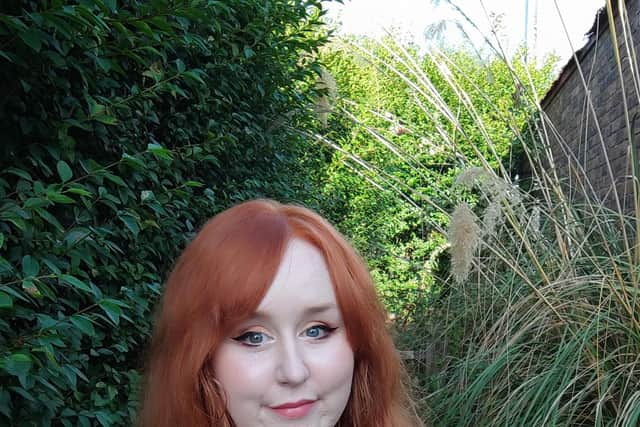'I became scared of the whole world': Lanarkshire woman shares story of OCD to challenge misconceptions
She had the same hunger to “be around people and not be seen as a monster”, as she grappled with years of violent, intrusive thoughts about being brutally harmed, or harming other people.
Her skull cracking, her body impaled on a bedpost, eyes gouged out and blood streaming through her thoughts, Ms Halket has had intrusive thoughts for as long as she can remember.
Advertisement
Hide AdAdvertisement
Hide AdBut it was not until the age of 21, after a suicide attempt following a difficult few years as a student away from home, that she was finally diagnosed with obsessive compulsive disorder (OCD).


As a teenager she knew little about OCD, associating it only with the hand-washing and focus on germs often present in popular representations, and never imagining that it could be linked to the horror of her unwelcome thoughts.
After waiting years for a diagnosis and then again for treatment, Ms Halket now lives “very well” alongside her condition.
And in a new memoir, Blade in the Shadow, she has shared her story in the hope of reducing stigma around OCD and encouraging others to seek treatment.
“I think even though there's been a lot of progress in the conversation around mental health, OCD is still one of those disorders that is still really misunderstood,” she said.
“People say things like ‘I’m so OCD, look at my tidy sock drawer.’
“I was sitting there having these really violent intrusive thoughts, and I thought if that’s what people think OCD is like … it just makes me really sad.
“There are a lot of people suffering out there and I feel like that phrase just dismisses them in a way.”
Advertisement
Hide AdAdvertisement
Hide AdMs Halket has become “almost used to” these sort of comments, but wants to be part of a movement to change perceptions.
“Sometimes when I hear those things, I want to walk up to that person and point to their socks and say ‘you think that’s OCD? I've spent the whole morning with images of beheaded children in my head’,” she said.
“There are more media representations of contamination OCD, with hand washing and germs. But the kind of OCD that I have is harm OCD, which is characterised by very violent, intrusive thoughts about hurting yourself or others, or people harming you. It can come in a couple of different forms.
“When I was thinking about writing the book, I wanted to put the reader into that space of when I wake up in the morning and these are the first thoughts that I have.”
The first part of Blade in the Shadow includes many detailed descriptions of violent, bloody images that have intruded on Ms Halket’s thoughts.
The memoir tells the story of Ms Halket’s first time at university, when she moved from a quiet village in Lanarkshire to Glasgow to study English and film.
She did not yet have a diagnosis of OCD, but experienced some of her worst symptoms during this time, which she believes were brought on partly by the turmoil of new experiences and a new city as a vulnerable teenager.
The situation was made worse by several experiences of serious sexual assault, which seemed to legitimise her fear of being harmed.
Advertisement
Hide AdAdvertisement
Hide Ad“Moving out of my cosy quiet village of black woods and going to university at 18 in a big city, I think that was a bit of a catalyst for some of my worst thoughts and experiences,” she said.
“You're just at that age where you're so vulnerable, and I think there were certain experiences that I had, particularly sexual assault, that happens a lot in the university environment and is maybe not spoken about too much.
“I think that trauma and violence made the violent thoughts even worse. I became scared of the whole world, it just intensified everything.
“It was almost like OCD latched on said ‘right, here’s the evidence that you should be scared, you are going to be harmed, the world is a violent place’.
“For a long time I couldn’t see the flip side of that, which is there's a lot of joy and love and amazing things in the world, but the disorder just takes that away from you.”
Ms Halket dropped out after two years at Glasgow University and moved to Dundee to study mental health nursing.
But her symptoms became worse, and after a suicide attempt she sought help and was given a diagnosis.
After a two-year wait and various rounds of medication, she began acceptance and commitment therapy, which has been “life-changing”.
Advertisement
Hide AdAdvertisement
Hide AdShe now lives with her partner in Carluke, also in South Lanarkshire.
“Now it's about living beside the disorder, and that’s the message I want to get out there,” she said.
“It is possible. I still have all these violent thoughts in my head, but through therapy I've learned how to live beside them, and live very well.
“I don't want people with OCD to think that that is always how it's going to be, it's not.”
Blade in the Shadow, by Jillian Halket, will be published by Guts Publishing in October.
Information about OCD can be found on the NHS Inform website. Samaritans can be contacted for free, 24 hours a day, on 116 123, or [email protected]. Visit samaritans.org for more information.
A message from the Editor:
Thank you for reading this article. We're more reliant on your support than ever as the shift in consumer habits brought about by coronavirus impacts our advertisers.
If you haven't already, please consider supporting our trusted, fact-checked journalism by taking out a digital subscription.
Comments
Want to join the conversation? Please or to comment on this article.
